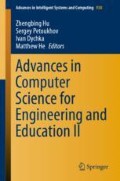Abstract
We present an approximation algorithm to solve the NP-hard scheduling problem of minimizing the total tardiness on identical parallel machines with a common due date and release dates of jobs. The algorithm has an estimate of the maximum possible deviation of its approximate solution from the optimum for each individual problem instance. It is based on the PSC-algorithm for the problem with equal release dates of jobs. Sufficient signs of optimality of a feasible solution and the estimate of the deviation of the obtained functional value from the optimum are known for the PSC-algorithm. The functional value obtained by the PSC-algorithm is the lower bound of the deviation of the functional value obtained by the approximation algorithm from the optimum for each individual problem instance. We give the computational data for test instances with dimensions of up to 40,000 jobs and 30 machines. The research shows that the developed algorithm is a very efficient method for the problem solving which allows to solve problems of any practical dimension. The average frequency of an optimal solution obtaining was 29.7%, and the average deviation from the optimum was 6.12%.
Access this chapter
Tax calculation will be finalised at checkout
Purchases are for personal use only
References
Pinedo, M.L.: Scheduling: Theory, Algorithms, and Systems. Springer, Cham (2016). https://doi.org/10.1007/978-3-319-26580-3
Heydari, M., Hosseini, S.M., Gholamian, S.A.: Optimal placement and sizing of capacitor and distributed generation with harmonic and resonance considerations using discrete particle swarm optimization. Int. J. Intell. Syst. Appl. (IJISA) 5(7), 42–49 (2013). https://doi.org/10.5815/ijisa.2013.07.06
Wang, F., Rao, Y., Wang, F., Hou, Y.: Design and application of a new hybrid heuristic algorithm for flow shop scheduling. Int. J. Comput. Netw. Inf. Secur. (IJCNIS) 3(2), 41–49 (2011). https://doi.org/10.5815/ijcnis.2011.02.06
Cai, Y.: Artificial Fish School Algorithm applied in a combinatorial optimization problem. Int. J. Intell. Syst. Appl. (IJISA) 2(1), 37–43 (2010). https://doi.org/10.5815/ijisa.2010.01.06
Fomin, F.V., Kratsch, D.: Exact Exponential Algorithms. Springer, Heidelberg (2010). https://doi.org/10.1007/978-3-642-16533-7
Soltani, N., Soleimani, B., Barekatain, B.: Heuristic algorithms for task scheduling in cloud computing: a survey. Int. J. Comput. Netw. Inf. Secur. (IJCNIS) 9(8), 16–22 (2017). https://doi.org/10.5815/ijcnis.2017.08.03
Garg, R., Singh, A.K.: Enhancing the discrete particle swarm optimization based workflow grid scheduling using hierarchical structure. Int. J. Comput. Netw. Inf. Secur. (IJCNIS) 5(6), 18–26 (2013). https://doi.org/10.5815/ijcnis.2013.06.03
Mishra, M.K., Patel, Y.S., Rout, Y., Mund, G.B.: A survey on scheduling heuristics in grid computing environment. Int. J. Mod. Educ. Comput. Sci. (IJMECS) 6(10), 57–83 (2014). https://doi.org/10.5815/ijmecs.2014.10.08
Sajedi, H., Rabiee, M.: A metaheuristic algorithm for job scheduling in grid computing. Int. J. Mod. Educ. Comput. Sci. (IJMECS) 6(5), 52–59 (2014). https://doi.org/10.5815/ijmecs.2014.05.07
Hwang, K., Dongarra, J., Fox, G.: Distributed and Cloud Computing: From Parallel Processing to the Internet of Things. Morgan Kaufmann, Burlington (2012)
Brucker, P., Knust, S.: Complex Scheduling, 2nd edn. GOR-Publications Series. Springer, Heidelberg (2012). https://doi.org/10.1007/978-3-642-23929-8
Zgurovsky, M.Z., Pavlov, A.A.: Algorithms and software of the four-level model of planning and decision making. In: Combinatorial Optimization Problems in Planning and Decision Making: Theory and Applications. 1st edn. Studies in Systems, Decision and Control, vol. 173, pp. 407–518. Springer, Cham (2019). https://doi.org/10.1007/978-3-319-98977-8_9
Yalaoui, F.: Minimizing total tardiness in parallel-machine scheduling with release dates. Appl. Evol. Comput. 3(1), 21–46 (2012). https://doi.org/10.4018/jaec.2012010102
Tanaev, V.S., Gordon, V.S., Shafransky, Y.M.: Scheduling Theory. Single-Stage Systems. Springer, Dordrecht (1994). https://doi.org/10.1007/978-94-011-1190-4
Tanaev, V.S., Shkurba, V.V.: Vvedenie v Teoriju Raspisaniy (Introduction to Scheduling Theory). Nauka, Moscow (1975). (in Russian)
Zgurovsky, M.Z., Pavlov, A.A.: The total tardiness of tasks minimization on identical parallel machines with arbitrary fixed times of their start and a common due date. In: Combinatorial Optimization Problems in Planning and Decision Making: Theory and Applications, 1st edn. Studies in Systems, Decision and Control, vol. 173, pp. 265–290. Springer, Cham (2019). https://doi.org/10.1007/978-3-319-98977-8_6
Zgurovsky, M.Z., Pavlov, A.A.: Introduction. In: Combinatorial Optimization Problems in Planning and Decision Making: Theory and Applications, 1st edn. Studies in Systems, Decision and Control, vol. 173, pp. 1–14. Springer, Cham (2019). https://doi.org/10.1007/978-3-319-98977-8_1
Kramer, A., Subramanian, A.: A unified heuristic and an annotated bibliography for a large class of earliness–tardiness scheduling problems. J. Sched. 20, 1–37 (2017). https://doi.org/10.1007/s10951-017-0549-6
Kovalyov, M.Y., Werner, F.: Approximation schemes for scheduling jobs with common due date on parallel machines to minimize total tardiness. J. Heuristics 8(4), 415–428 (2002). https://doi.org/10.1023/A:1015487829051
Jouglet, A., Savourey, D.: Dominance rules for the parallel machine total weighted tardiness scheduling problem with release dates. Comput. Oper. Res. 38(9), 1259–1266 (2011). https://doi.org/10.1016/j.cor.2010.12.006
Azizoglu, M., Kirca, O.: Tardiness minimization on parallel machines. Int. J. Prod. Econ. 55(2), 163–168 (1998). https://doi.org/10.1016/s0925-5273(98)00034-6
Yalaoui, F., Chu, C.: Parallel machine scheduling to minimize total tardiness. Int. J. Prod. Econ. 76(3), 265–279 (2002). https://doi.org/10.1016/s0925-5273(01)00175-x
Shim, S.-O., Kim, Y.-D.: Scheduling on parallel identical machines to minimize total tardiness. Eur. J. Oper. Res. 177(1), 135–146 (2007). https://doi.org/10.1016/j.ejor.2005.09.038
Lenstra, J., Kan, A.R., Brucker, P.: Complexity of machine scheduling problems. Annals Discr. Math. 1, 343–362 (1977). https://doi.org/10.1016/s0167-5060(08)70743-x
Baptiste, P., Jouglet, A., Savourey, D.: Lower bounds for parallel machine scheduling problems. Int. J. Oper. Res. 3(6), 643–664 (2008). https://doi.org/10.1504/ijor.2008.019731
Tanaka, S., Fujikuma, S.: A dynamic-programming-based exact algorithm for general single-machine scheduling with machine idle time. J. Sched. 15(3), 347–361 (2011). https://doi.org/10.1007/s10951-011-0242-0
Lawler, E.L., Moore, J.M.: A functional equation and its application to resource allocation and sequencing problems. Manag. Sci. 16(1), 77–84 (1969). https://doi.org/10.1287/mnsc.16.1.77
Yuan, J.: The NP-hardness of the single machine common due date weighted tardiness problem. J. Syst. Sci. Complex. 5(4), 328–333 (1992)
Author information
Authors and Affiliations
Corresponding author
Editor information
Editors and Affiliations
Rights and permissions
Copyright information
© 2020 Springer Nature Switzerland AG
About this paper
Cite this paper
Pavlov, A.A., Misura, E.B., Melnikov, O.V., Mukha, I.P., Lishchuk, K.I. (2020). Approximation Algorithm for Parallel Machines Total Tardiness Minimization Problem for Planning Processes Automation. In: Hu, Z., Petoukhov, S., Dychka, I., He, M. (eds) Advances in Computer Science for Engineering and Education II. ICCSEEA 2019. Advances in Intelligent Systems and Computing, vol 938. Springer, Cham. https://doi.org/10.1007/978-3-030-16621-2_43
Download citation
DOI: https://doi.org/10.1007/978-3-030-16621-2_43
Published:
Publisher Name: Springer, Cham
Print ISBN: 978-3-030-16620-5
Online ISBN: 978-3-030-16621-2
eBook Packages: Intelligent Technologies and RoboticsIntelligent Technologies and Robotics (R0)

